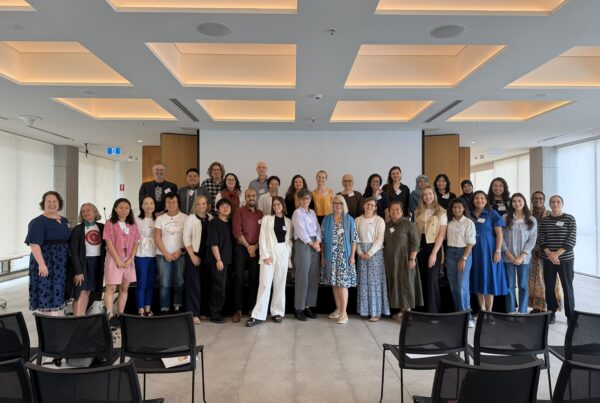In her 2007 ethnographic study of eight US law schools, Elizabeth Mertz traces the process through which law students learn to “think like a lawyer” in order to become one. She shows how this process is essentially about language: learning to think like a lawyer means adopting new ways of reading, writing and talking.
Crucially, Mertz demonstrates that underlying these processes is a set of linguistic ideologies – assumptions we make about language and how it should manifest in particular social contexts. For example, she identifies a practice in legal analysis and reasoning, as taught in these classrooms: the social characteristics and personal perspectives of people who appear in legal cases and problem questions are rendered irrelevant and made invisible, in favour of the legally relevant facts. Issues of morality and emotion are likewise pushed aside as unimportant.
As students undergo this transformative process of learning to think and speak like a lawyer, Mertz questions the effects this may have on how law students see the world, their ability to see social diversity and inequality and to identify and challenge issues of injustice in their future work.
But what about how students think about themselves? What if they personally face marginalization? And what of their diverse language repertoires? If thinking like a lawyer depends on speaking like one, what is this speech expected to sound like? And what impact does sounding differently have on one’s sense of professional identity and self-worth?
These were just some of the questions raised in my recent digital ethnographic research with students enrolled in a Graduate Diploma in Migration Law and Practice (GDMLP). This one-year university program is required for people who do not have an Australian legal qualification to become Registered Migration Agents (RMAs) and offer professional assistance to people applying for a visa in Australia. Unlike law degrees, which remain difficult to access for many, it has been estimated that at least half of the GDMLP cohort has English as a second language (L2), and perhaps even more are first generation migrants.
I attended online workshops during which students practiced their client interviewing skills through role-plays, observing this practical work and debriefing with them. I also conducted research interviews with students at various points during their study and after graduating, over a period of three years. To have immediate impact, I also offered my interdisciplinary expertise to enhance learning, presenting on various aspects of communication, and helping the teaching team to develop and refine learning materials (see Smith-Khan & Giles 2025).
In a new article, I share some of the ways students talk and think about their study, their future professional goals, their existing strengths, and the skills they wish to improve and how. The discussions brought up beliefs about language, closely tied to ideas about proficiency, professionalism and identity.
Bilingualism: optional benefit, real risk
While every participant who speaks multiple languages planned to use them in their future job, with at least some of their clients, there was a clear hierarchy in how different languages were valued, with English appearing at the apex as non-negotiable, and other languages more as optional extras (see also Piller & Gerber 2021).
Paolo* The English level, I think it’s very very important too.
Laura Yeah.
Paolo I’m Italian, as I said before, I work with a lot of Italians, and they don’t speak English. And will have, a hundred percent sure that I will have a lot of consultations within Italian community. I will go to Italy to do seminars, and that will be in Italian.
Laura Yeah.
Paolo So in that way, if you think in that, in that way, you don’t need English, okay?
Laura Yes.
Paolo I mean, ‘I don’t need to have a very high English level, because my-, ‘I’m Chinese, I just talk in Mandarin, my consultation in Mandarin, my clients are in Mandarin.’ Okay. And it makes sense. But then you have to do applications in English, you have to study the uh legislation in English. So if the legislation, if you don’t understand properly the legislation, if you mixed up a word, all your translation in Chinese, or in Italian, or in any other language, won’t be, won’t be correct.
Okay? So it’s very, very important that they understand, the people that they want to become a migration agent, that they understand everything. [Paolo, interview 1/2, 2020]
On one level, this makes perfect sense: the work does indeed require close engagement with legal and institutional texts that are only available in English, and application forms required to be submitted to the Immigration Department only are allowed in English. However, this type of discourse also assumes bilingualism is a potential risk to English language proficiency: rather than acknowledging the crucial skills bilingual and multilingual people bring to this work, the fact that they speak more than one language is regarded as a threat to their English. This resembles political and institutional discourses in which the ‘monolingual mindset’ is evident, including in the language proficiency rules around becoming an RMA, and in other areas like skilled migration and university admission, where proficiency is assumed for some, but not for others (Smith-Khan 2021a; Piller & Bodis, 2023). Such discourses are also evident in public political debates about migration and registered migration agents (Smith-Khan 2021b).
‘Australian’ native speakers and language choice
Perceptions about identity are also closely connected with these types of ideologies. As L2 English speakers discuss their experiences and efforts to develop speaking skills in class and connect these evaluations with their future language practices and career plans.
Gemma: If you have poor communication you give them the impression you’re not professional. You probably have lots of knowledge in your mind but you just can’t express yourself properly, or too slow, or I don’t know. You’ve got to give them, the client the impression that oh no, you are professional. I can trust you. You can do the job for me. So I try to, the reason why I said um, um, the native English speaker is better, probably that’s just one side about um, they easily use language um, uh, like more vocabulary than us. We can’t use like beautiful words or whatever it is to express myself uh, precisely. So uh, that will give client the impression like, you not professional like I can’t trust you…. So, yes. So that’s why I said if I speak to Chinese, probably I’ll be more confident. They, they will, will feel less, um, less suspicious. I don’t know. Um, less, how will I say? Um, more trust on you than English-speaking people. [Gemma, interview 1/1, 2020]
Evaluations like these compare L2 English speakers’ skills vis-à-vis what they consider the ideal student and future RMA, an L1 English speaker, with implications for professional identity and future work plans. They also link general professional competence with language proficiency and oral fluency, something that again also comes up in the broader discourse (see Smith-Khan 2021b).
However, these ideologies extend even further, to national identity and moral worth.
Gemma: Yes, with my, one of my classmates… Uh, at the beginning it wasn’t very good. Oh, he’s local. He’s Australian. And he’s very, I feel he pick up very quickly and easily and then he has to put up with me because I have to think. And, you know, thinking probably slower than, than him and then speak slowly. Uh, yes so I find the difference and I try to, I just want to try to improve that by talking more [Gemma, interview 1/1, 2020].
In this encounter, Gemma evaluates herself in relation to an “Australian”, “local” L1-speaking classmate. Here, speaking and thinking are closely connected, and she comes out positioned as a burden in the interaction – something her classmate must “put up with” because of her slower thinking and speaking.
While such discourse is not surprising in this particular social and political context, it sits uneasily against the facts we have about Gemma’s personal and professional background, along with the direct linguistic data collected in the project. She came to Australia as a skilled migrant and was granted a permanent visa because of her professional qualifications. She has been an Australian citizen for over a decade, working as a civil servant in a professional role, in a regional Australian city, in a highly monolingual English office environment. Her English language proficiency is indisputably high. Yet her evaluation demonstrates the power of native-speaker and monolingual mindset ideologies about languages: her capability, her professionalism, and even her nationality become inferior and vulnerable to the point that she imagines herself as at best a burden, and at worst incapable of being trusted, for an L1 English speaking audience in this context (see Piller et al 2024).
Hard work, pushback and pragmatism
However, all is not lost for this group of aspiring migration practitioners. Both L1 and L2 English speakers heavily stressed the need to practice speaking and to study hard to continue to improve their professional skills. While this emphasises individual responsibility and creates an additional burden for L2 speakers, it still allows for a degree of agency and a sense of opportunity: developing professional skills and identity are not regarded as impossible.
At the same time, students also demonstrated a critical awareness of the broader social and political contexts, and what these mean for how people are (sometimes unfairly) evaluated. For example, one student pointed to the broader political context of migration and perceptions of migrants to make sense of how RMAs are perceived: if the government is “very anti-immigration”, it follows that RMAs would be seen as “unnecessary” or a “pain to deal with”, and it would be made difficult for them to enter the profession.
Another student pushed back against the apparent need for people to speak standard Australian English. Nitin explained how whether someone comes across as rude can be a matter of the listener’s perception. He was thus able to turn the spotlight onto the interlocutor, who may misjudge L2 speakers who “don’t have those little, nice touches” in their speech, rather than the “deficient” speaker, and at the same time claim an advantage over L1 interlocutors, as more compassionate and knowledgeable in interactions involving speakers of diverse language varieties or proficiency. However, Nitin still ends on a pragmatic note, related to his own lived reality:
Nitin: People, when I talked to the native speakers here, sometimes they’d think I’m talking rude. My colleagues said that on a few occasions, and I started thinking, what was rude in that? … So I adapted it over a period of about nine years. Now I know what to speak and what not to speak. [Nitin, interview 1/2, 2020]
Therefore, while it is clear that students may come to internalize linguistic ideologies that frame their language practices and repertoires as inferior or in need of ongoing improvement, there is still space to reclaim and challenge these ideologies. However, even while doing so, they must still navigate the very real and enduring practical effects such ideologies have within their social and professional contexts.
Note
*Participant names are pseudonyms.
References
Mertz, E. (2007). The language of law school: Learning to “think like a lawyer”. Oxford University Press.
Piller, I. & Bodis, A. (2024). Marking and unmarking the (non)native speaker through English language proficiency requirements for university admission. Language in Society, 53(1), 1-23. https://doi.org/10.1017/S0047404522000689
Piller, I. & Gerber, L. (2021). Family language policy between the bilingual advantage and the monolingual mindset, International Journal of Bilingual Education and Bilingualism, (24)5, 622-635. https://doi.org/10.1080/13670050.2018.1503227
Piller, I. et al. (2024). Life in a New Language. Oxford University Press.
Smith-Khan, L. (2025, AOP). Language, culture and professional communication in migration law education, Language, Culture and Curriculum, https://doi.org/10.1080/07908318.2025.2481051
Smith-Khan, L. (2021). ‘Common language’ and proficiency tests: a critical examination of registration requirements for Australian registered migration agents. Griffith Law Review, 30(1), 97–121. https://doi.org/10.1080/10383441.2021.1900031
Smith-Khan, L. (2021b). Deficiencies and loopholes: Clashing discourses, problems and solutions in Australian migration advice regulation. Discourse & Society, 32(5), 598-621. https://doi.org/10.1177/09579265211013113
Smith-Khan, L., & Giles, C. (2025, AOP). Improving client communication skills in migration law and practice education. Alternative Law Journal. https://doi.org/10.1177/1037969X251314205







 This work is licensed under a
This work is licensed under a
I’d love to hear from others about their study experiences and whether they can relate to the research participants in this study.